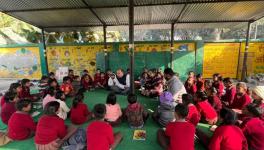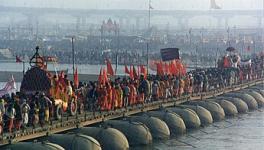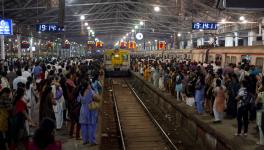Governments Must Implement the Constitution, Not Religious Texts
Representational use only.
Simple things need retelling when society is in a state of flux. The fact that India is a republic—has been one for more than 70 years—where sovereignty rests with the people and not with scriptures is one fact. That India runs by its Constitution and laws under it is another fact.
The Uttarakhand High Court reminded the state government of these facts when it objected to proposals to live-stream the historic Char Dham Yatra on the plea that the scriptures do not sanction it. The court rejected the petition, saying India is a democracy where the rule of law, not religious texts, govern.
Of course, the High Court has intervened to remind the government of its constitutional duties and questioned it for pandering to “public sentiment” before. When the state and the central government openly invited people to attend the Kumbh Mela, the High Court had categorically warned it would become a super-spreader event during the Covid-19 pandemic.
When the High Court stayed the Char Dham Yatra, it gave the simple logic that rather than being considerate of the feelings of a few, it is crucial to protect everyone from the Delta Plus mutant of the Novel Coronavirus.
Today, the “feelings of a few” are regularly packaged and peddled as “public sentiment”. And this seems to take precedence over the larger common good. However, of late, the courts have introduced a semblance of sanity to governance by blocking such attempts.
In Karnataka, the courts had to deal with loudspeakers deployed at religious places. It had earlier issued orders to the police to take action against loudspeaker users but it dilly-dallied. The court summoned the police and instructed them to implement the order, not analyse sound pollution norms.
Govind Mathur, the former Chief Justice of the Allahabad High Court (he retired in April after a two-year term) vindicates this further. He headed the court while the state government faced growing criticism for arbitrary actions and policies, such as on encounter killings and love jihad, respectively.
A journalist has painstakingly detailed the twelve important cases dealt with by Mathur, including police brutality at the Aligarh Muslim University (AMU), unauthorised surveillance of citizens by the state, the need for door-to-door vaccination, and to protect the human rights of prisoners. He also set aside the “arbitrary” and “illegal” detention of Dr Kafeel Khan under the infamous National Security Act (NSA) for a speech he delivered at AMU during the anti-CAA protests.
Contrary to what the government says, he held the speech was a clarion call for national unity and integrity. He took suo motu cognizance of the posters put up by the Uttar Pradesh government of the anti-CAA protesters, directing their removal and calling it an “unwarranted interference in the privacy of people” and a violation of Article 21 of the Constitution.
Even the majority judgement (4-1) in Sabarimala, dealing with the prohibition of women of menstruating age from entering a temple, is in a similar vein. Calling it a custom of exclusion along gender lines (which is unconstitutional), the Supreme Court said the restriction on entry violated the fundamental rights of women. It struck down Rule 3(b) of the Kerala Hindu Places of Public Worship Act, which had allowed Hindu denominations to customarily exclude women from places of worship.
It is also important to mention that the dissenting judge, Justice Indu Malhotra, held that courts should not interfere in religious affairs in a secular polity, leaving those who practise the faith to decide. Yet, significantly, this majority judgement opened up the issue of exclusion of women from places of worship on various pretexts elsewhere.
Or take the well-known cricketer Mahendra Singh Dhoni, who faced a case of hurting religious sentiment when a magazine cover depicted him as the Hindu god Vishnu. Justices Dipak Misra, AM Khanwilkar and MM Shantanagoudar rejected the petition against Dhoni, saying, “Insults to religion offered unwittingly or carelessly, without any deliberate or malicious intention to outrage religious feelings, should not be seen as hurting religious sentiments.”
To sum up, the judiciary has stood on multiple instances against a “majoritarian executive” that has “backed mobs attacking civil liberties”. Sticking to constitutional principles and values during an onslaught based on so-called public sentiment, when faith-based politics is on the ascendant, is no easy feat, so the judges deserve accolades.
That said, it is troubling that this pandering to sentiments is not limited to Hindutva right-wing. Punjab has cleared a more tough law on sacrilege under a Congress government, which is also a step towards introducing blasphemy laws. It approved amendments to the Code of Criminal Procedure (CrPC) and the Indian Penal Code (IPC) to make sacrilege of all religious texts punishable with life imprisonment. Blasphemy provisions go against secularism enshrined in our Constitution and consolidate the hold of sectarianism. They strengthen extremists of all religions.
Now, there are reports that the Uttar Pradesh government has decided to go ahead with the Kanwar Yatra, though the Uttarakhand government has decided not to. On 14 July, the Supreme Court took cognizance of the Uttar Pradesh decision, keeping in mind that the threat of a third wave of Covid-19 hangs in the air, and expert warnings that allowing festivals and large gatherings is dangerous.
The World Health Organisation (WHO) has linked the surge in Covid-19 in India to religious and political gatherings across the country. The latest appeal by the Indian Medical Association, based on global evidence and the history of pandemics, says the third wave is “inevitable and imminent” and that pilgrimages and tourism can wait.
It is no coincidence that the IMA issued this appeal when the city of Puri in Odisha and Ahmedabad, the capital of Gujarat, held Jagannath Yatra celebrations, albeit on a reduced scale.
The Covid-19 vaccination programme is still very far from achieving mass scale. India cannot count on having prevented further spread of the infection. Despite the propaganda and hype, to date, India has fully vaccinated less than 4% of its 140 crore population. Since many pro-government media outlets love comparisons with the US, note that it has fully vaccinated 46.62% of its residents. Meanwhile, the aftermath of the Kumbh Mela, which metamorphosed into a massive Covid-19 hotspot, is hardly behind us.
The question is whether the judiciary will intervene again, even more proactively, to save everyone from the Delta Plus mutant or restrict itself to advisories as plans are afoot to hold the Kanwar Yatra or open the country to other mass religious functions.
The author is a freelance journalist. The views are personal.
Get the latest reports & analysis with people's perspective on Protests, movements & deep analytical videos, discussions of the current affairs in your Telegram app. Subscribe to NewsClick's Telegram channel & get Real-Time updates on stories, as they get published on our website.
























